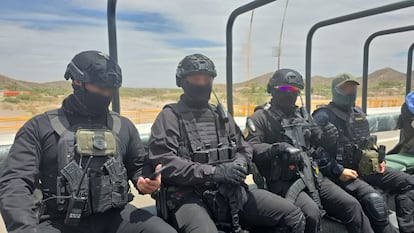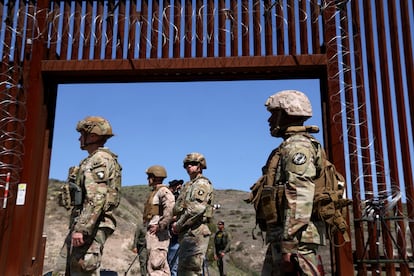Security ties between Mexico and US strained by veiled threats
An operation in Sinaloa involving agents certified by ICE has sparked a new diplomatic clash, adding to tensions over Ovidio’s family entering the United States and the talk of sending troops south of the border

Quiet days are rare along the U.S.-Mexico border — a metonym that oversimplifies a complex binational relationship, more like a web of unpredictable tributaries feeding into a river with an ever-shifting course. Since Donald Trump’s return to the White House in January, security talks have centered on combating fentanyl trafficking and the criminal networks behind it. Trump has demanded results and brandished the threat of tariffs as leverage. It was a warning of what was to come. This stance has unsettled the Mexican government, which champions cooperation as its preferred approach, and is now on edge over remarks and actions originating north of the border.
The latest controversy flared up on Wednesday, sparked by a social media post from U.S. Immigration and Customs Enforcement (ICE). The agency announced the dismantling of three large-scale synthetic drug labs in Sinaloa, in an operation led by a group of Mexican prosecutors certified by ICE. One of the accompanying photos showed uniformed agents — prompting some Mexican media outlets to interpret the image as evidence of U.S. law enforcement operating on Mexican soil.
The presence of U.S. agents within Mexico strikes a particularly sensitive nerve in the U.S.-Mexico relationship. To defuse the growing tension, the U.S. Embassy in Mexico quickly clarified that the individuals in the photo were in fact Mexican agents. But by then, the snowball was already rolling — fueled by suspicious visual cues such as a badge resembling ICE insignia and a helmet bearing horizontal stripes similar to those on the U.S. flag.
The clarification came — ironically — just hours before the arrival of the new U.S. ambassador to Mexico, Ron Johnson, who has publicly supported the idea of armed intervention against drug cartels in the country.

Be that as it may, the issue made its way on Thursday to the morning press conference of Mexican President Claudia Sheinbaum, who added further ambiguity to the controversy with remarks that made the situation even harder to interpret. The president stated that the photo shared in ICE’s social media post does not correspond to any operation in Mexico. “Where did that photo come from, to begin with?” she asked. “What is it actually showing? It’s not a photo that matches the content of that publication,” she added.
As is often the case, Mexico’s Attorney General’s Office (FGR) — to which the agents supposedly certified by ICE belong — has provided no information on the matter. Was there an operation? When did it happen? And what was ICE’s exact role?
This incident might have gone unnoticed were it not for the broader context. Since January, the relationship between Mexico and the United States has resembled a political circus. Trump’s threats to impose tariffs on Mexican exports foreshadowed a series of veiled warnings — none as serious as the idea of sending U.S. troops south of the Rio Grande, a possibility that appeals to the Republican president and his cabinet. For them, this is the best way to combat drug cartels. In that context, the involvement of U.S. agents in Mexican operations — regardless of its relevance or benefits — is perceived in Mexico as an escalation of those threats.
And it’s not just the threats — it’s the sense that many important matters are being handled behind President Sheinbaum’s back, even though they concern both nations. The ICE case, for instance, comes just days after 17 relatives of alleged drug trafficker Ovidio Guzmán — captured in Mexico in January 2023 — entered the United States. Mexico’s security chief noted that the relatives had no outstanding legal issues in Mexico but stressed that the U.S. Department of Justice should have informed its Mexican counterparts. It’s a matter of respect — of institutional loyalty — especially considering it was Mexican soldiers who captured Guzmán.
In recent months, Mexico has complied with nearly every request from its northern neighbor. U.S. aircraft have flown over Sinaloa on intelligence missions; more than 30 inmates have been extradited from Mexican prisons to the U.S., bolstering the Republican administration’s image; and according to Sheinbaum’s government, drug seizures and lab destructions have reached record highs. Yet the response from the north often feels patronizing, as if Mexico was not doing enough. The political circus continues. In Mexico, the north is always in sight.
Sign up for our weekly newsletter to get more English-language news coverage from EL PAÍS USA Edition
Tu suscripción se está usando en otro dispositivo
¿Quieres añadir otro usuario a tu suscripción?
Si continúas leyendo en este dispositivo, no se podrá leer en el otro.
FlechaTu suscripción se está usando en otro dispositivo y solo puedes acceder a EL PAÍS desde un dispositivo a la vez.
Si quieres compartir tu cuenta, cambia tu suscripción a la modalidad Premium, así podrás añadir otro usuario. Cada uno accederá con su propia cuenta de email, lo que os permitirá personalizar vuestra experiencia en EL PAÍS.
¿Tienes una suscripción de empresa? Accede aquí para contratar más cuentas.
En el caso de no saber quién está usando tu cuenta, te recomendamos cambiar tu contraseña aquí.
Si decides continuar compartiendo tu cuenta, este mensaje se mostrará en tu dispositivo y en el de la otra persona que está usando tu cuenta de forma indefinida, afectando a tu experiencia de lectura. Puedes consultar aquí los términos y condiciones de la suscripción digital.









































